Rectified 120-cell
In geometry, a rectified 120-cell is a uniform 4-polytope formed as the rectification of the regular 120-cell.
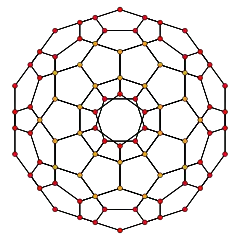 120-cell |
 Rectified 120-cell | ||
 600-cell |
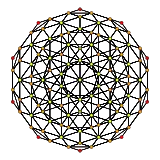 Rectified 600-cell | ||
| Orthogonal projections in H3 Coxeter plane | |||
|---|---|---|---|
E. L. Elte identified it in 1912 as a semiregular polytope, labeling it as tC120.
There are four rectifications of the 120-cell, including the zeroth, the 120-cell itself. The birectified 120-cell is more easily seen as a rectified 600-cell, and the trirectified 120-cell is the same as the dual 600-cell.
Rectified 120-cell
| Rectified 120-cell | |
|---|---|
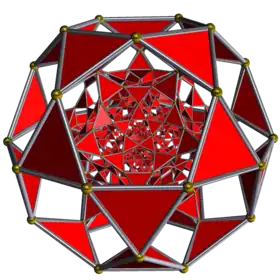 Schlegel diagram, centered on icosidodecahedon, tetrahedral cells visible | |
| Type | Uniform 4-polytope |
| Uniform index | 33 |
| Coxeter diagram | |
| Schläfli symbol | t1{5,3,3} or r{5,3,3} |
| Cells | 720 total: 120 (3.5.3.5) 600 (3.3.3) |
| Faces | 3120 total: 2400 {3}, 720 {5} |
| Edges | 3600 |
| Vertices | 1200 |
| Vertex figure |  triangular prism |
| Symmetry group | H4 or [3,3,5] |
| Properties | convex, vertex-transitive, edge-transitive |
In geometry, the rectified 120-cell or rectified hecatonicosachoron is a convex uniform 4-polytope composed of 600 regular tetrahedra and 120 icosidodecahedra cells. Its vertex figure is a triangular prism, with three icosidodecahedra and two tetrahedra meeting at each vertex.
Alternative names:
- Rectified 120-cell (Norman Johnson)
- Rectified hecatonicosichoron / rectified dodecacontachoron / rectified polydodecahedron
- Icosidodecahedral hexacosihecatonicosachoron
- Rahi (Jonathan Bowers: for rectified hecatonicosachoron)
- Ambohecatonicosachoron (Neil Sloane & John Horton Conway)
Projections
| 3D parallel projection | |
|---|---|
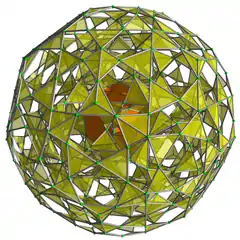 |
Parallel projection of the rectified 120-cell into 3D, centered on an icosidodecahedral cell. Nearest cell to 4D viewpoint shown in orange, and tetrahedral cells shown in yellow. Remaining cells culled so that the structure of the projection is visible. |
| H4 | - | F4 |
|---|---|---|
 [30] |
 [20] |
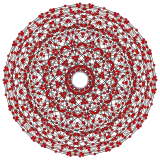 [12] |
| H3 | A2 / B3 / D4 | A3 / B2 |
 [10] |
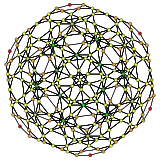 [6] |
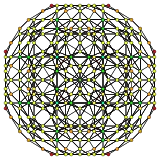 [4] |
Related polytopes
| H4 family polytopes | |||||||||||
|---|---|---|---|---|---|---|---|---|---|---|---|
| 120-cell | rectified 120-cell |
truncated 120-cell |
cantellated 120-cell |
runcinated 120-cell |
cantitruncated 120-cell |
runcitruncated 120-cell |
omnitruncated 120-cell | ||||
| {5,3,3} | r{5,3,3} | t{5,3,3} | rr{5,3,3} | t0,3{5,3,3} | tr{5,3,3} | t0,1,3{5,3,3} | t0,1,2,3{5,3,3} | ||||
 |
 |
 |
 |
 |
 |
 |
 | ||||
 |
 |
 |
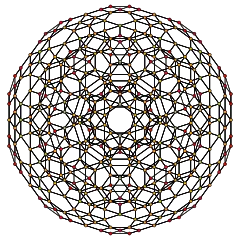 |
 |
 |
 | |||||
| 600-cell | rectified 600-cell |
truncated 600-cell |
cantellated 600-cell |
bitruncated 600-cell |
cantitruncated 600-cell |
runcitruncated 600-cell |
omnitruncated 600-cell | ||||
| {3,3,5} | r{3,3,5} | t{3,3,5} | rr{3,3,5} | 2t{3,3,5} | tr{3,3,5} | t0,1,3{3,3,5} | t0,1,2,3{3,3,5} | ||||
Notes
References
- Kaleidoscopes: Selected Writings of H. S. M. Coxeter, edited by F. Arthur Sherk, Peter McMullen, Anthony C. Thompson, Asia Ivic Weiss, Wiley-Interscience Publication, 1995, ISBN 978-0-471-01003-6
- (Paper 22) H.S.M. Coxeter, Regular and Semi-Regular Polytopes I, [Math. Zeit. 46 (1940) 380-407, MR 2,10]
- (Paper 23) H.S.M. Coxeter, Regular and Semi-Regular Polytopes II, [Math. Zeit. 188 (1985) 559-591]
- (Paper 24) H.S.M. Coxeter, Regular and Semi-Regular Polytopes III, [Math. Zeit. 200 (1988) 3-45]
- J.H. Conway and M.J.T. Guy: Four-Dimensional Archimedean Polytopes, Proceedings of the Colloquium on Convexity at Copenhagen, page 38 und 39, 1965
- N.W. Johnson: The Theory of Uniform Polytopes and Honeycombs, Ph.D. Dissertation, University of Toronto, 1966
External links
- Convex uniform polychora based on the hecatonicosachoron (120-cell) and hexacosichoron (600-cell) - Model 33, George Olshevsky.
- rectified 120-cell Marco Möller's Archimedean polytopes in R4 (German)
- Klitzing, Richard. "4D uniform polytopes (polychora) o3o3x5o - rahi".
- (in German) Four-dimensional Archimedean Polytopes, Marco Möller, 2004 PhD dissertation
- H4 uniform polytopes with coordinates: r{5,3,3}
This article is issued from Wikipedia. The text is licensed under Creative Commons - Attribution - Sharealike. Additional terms may apply for the media files.
